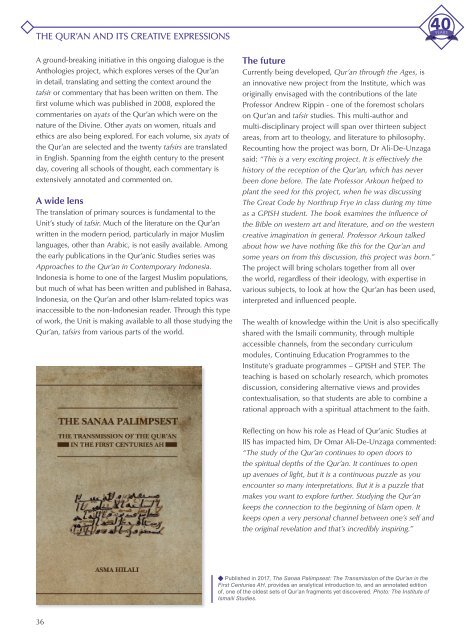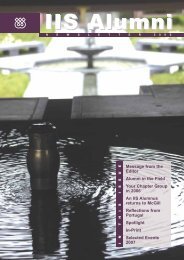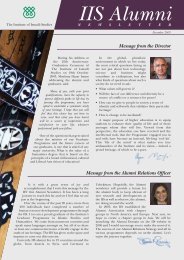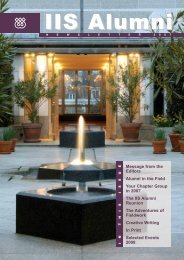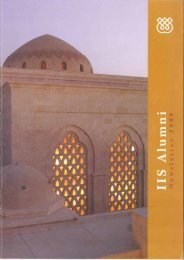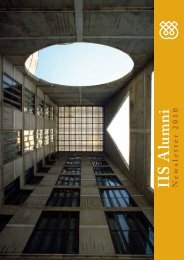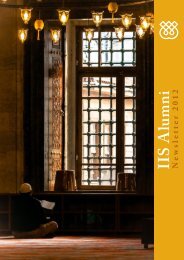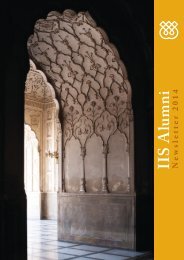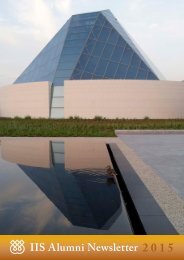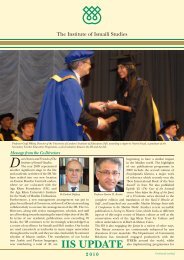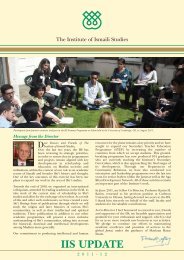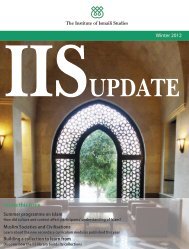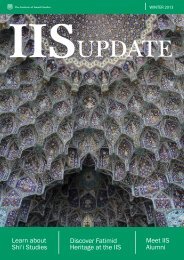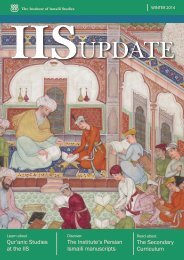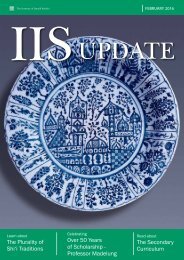IIS Update 2018
A special fortieth anniversary edition of IIS annual magazine.
A special fortieth anniversary edition of IIS annual magazine.
Create successful ePaper yourself
Turn your PDF publications into a flip-book with our unique Google optimized e-Paper software.
THE QUR’AN AND ITS CREATIVE EXPRESSIONS<br />
A ground-breaking initiative in this ongoing dialogue is the<br />
Anthologies project, which explores verses of the Qur’an<br />
in detail, translating and setting the context around the<br />
tafsir or commentary that has been written on them. The<br />
first volume which was published in 2008, explored the<br />
commentaries on ayats of the Qur’an which were on the<br />
nature of the Divine. Other ayats on women, rituals and<br />
ethics are also being explored. For each volume, six ayats of<br />
the Qur’an are selected and the twenty tafsirs are translated<br />
in English. Spanning from the eighth century to the present<br />
day, covering all schools of thought, each commentary is<br />
extensively annotated and commented on.<br />
A wide lens<br />
The translation of primary sources is fundamental to the<br />
Unit’s study of tafsir. Much of the literature on the Qur’an<br />
written in the modern period, particularly in major Muslim<br />
languages, other than Arabic, is not easily available. Among<br />
the early publications in the Qur’anic Studies series was<br />
Approaches to the Qur’an in Contemporary Indonesia.<br />
Indonesia is home to one of the largest Muslim populations,<br />
but much of what has been written and published in Bahasa,<br />
Indonesia, on the Qur’an and other Islam-related topics was<br />
inaccessible to the non-Indonesian reader. Through this type<br />
of work, the Unit is making available to all those studying the<br />
Qur’an, tafsirs from various parts of the world.<br />
The future<br />
Currently being developed, Qur’an through the Ages, is<br />
an innovative new project from the Institute, which was<br />
originally envisaged with the contributions of the late<br />
Professor Andrew Rippin - one of the foremost scholars<br />
on Qur’an and tafsir studies. This multi-author and<br />
multi-disciplinary project will span over thirteen subject<br />
areas, from art to theology, and literature to philosophy.<br />
Recounting how the project was born, Dr Ali-De-Unzaga<br />
said: “This is a very exciting project. It is effectively the<br />
history of the reception of the Qur’an, which has never<br />
been done before. The late Professor Arkoun helped to<br />
plant the seed for this project, when he was discussing<br />
The Great Code by Northrup Frye in class during my time<br />
as a GPISH student. The book examines the influence of<br />
the Bible on western art and literature, and on the western<br />
creative imagination in general. Professor Arkoun talked<br />
about how we have nothing like this for the Qur’an and<br />
some years on from this discussion, this project was born.”<br />
The project will bring scholars together from all over<br />
the world, regardless of their ideology, with expertise in<br />
various subjects, to look at how the Qur’an has been used,<br />
interpreted and influenced people.<br />
The wealth of knowledge within the Unit is also specifically<br />
shared with the Ismaili community, through multiple<br />
accessible channels, from the secondary curriculum<br />
modules, Continuing Education Programmes to the<br />
Institute’s graduate programmes – GPISH and STEP. The<br />
teaching is based on scholarly research, which promotes<br />
discussion, considering alternative views and provides<br />
contextualisation, so that students are able to combine a<br />
rational approach with a spiritual attachment to the faith.<br />
40<br />
YEARS<br />
Reflecting on how his role as Head of Qur’anic Studies at<br />
<strong>IIS</strong> has impacted him, Dr Omar Ali-De-Unzaga commented:<br />
“The study of the Qur’an continues to open doors to<br />
the spiritual depths of the Qur’an. It continues to open<br />
up avenues of light, but it is a continuous puzzle as you<br />
encounter so many interpretations. But it is a puzzle that<br />
makes you want to explore further. Studying the Qur’an<br />
keeps the connection to the beginning of Islam open. It<br />
keeps open a very personal channel between one’s self and<br />
the original revelation and that’s incredibly inspiring.”<br />
The Sanaa Palimpsest: The Transmission of the Qur’an in the<br />
provides an analytical introduction to, and an annotated edition<br />
of, one of the oldest sets of Qur’an fragments yet discovered. Photo: The Institute of<br />
<br />
36


